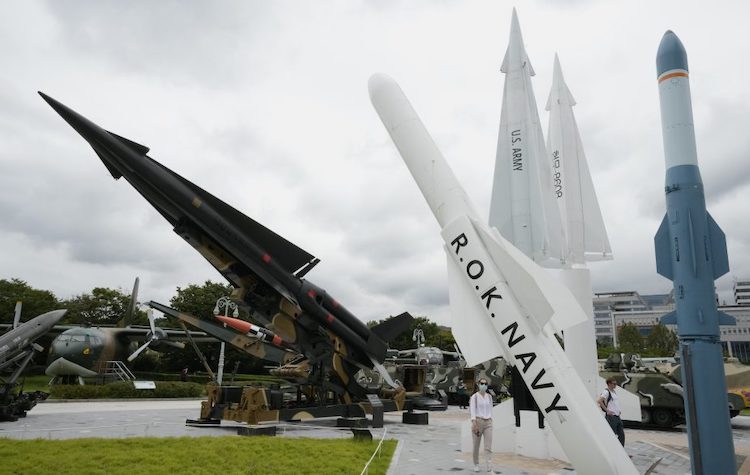
Image: South Korean and U.S. missiles are displayed at Korea War Memorial Museum in Seoul, South Korea on 31 Aug. 2022. Credit: AP Photo/Ahn Young-joon
By Thalif Deen
UNITED NATIONS (IDN) — As nuclear tensions continue to spread across the Korean Peninsula, South Korea has for the first time declared “nuclear weapons as a policy option”,—triggering the threat of a potentially new nuclear power looming in the horizon. [2023-01-19]
South Korean president Yoon Suk Yeol is quoted as saying that if North Korea’s nuclear threat grows, South Korea would consider building its own nuclear weapons or request the US to redeploy them in the Korean Peninsula.
Is this for real?
And how feasible is it for the Korean Peninsula to go nuclear—and join the world’s five major nuclear powers, the US, UK, France, Russia and China, all permanent members of the UN Security Council, along with India, Pakistan, Israel and North Korea?
According to a report in the New York Times June 13, Yoon’s comments marked the first time, since the US withdrew all of its nuclear weapons from the South in 1991, that a South Korean president has officially remarked about arming the country with nuclear weapons.
Washington removed its nuclear weapons from South Korea as part of its global nuclear arms reduction efforts.
“It’s possible that the problem gets worse and our country will introduce tactical nuclear weapons or build them on our own,” said Yoon, according to a transcript of his comments released by his office.
“If that’s the case, we can have our own nuclear weapons pretty quickly, given our scientific and technological capabilities.”
Emeritus Professor Ramesh Thakur, the Australian National University and Senior Research Fellow, Toda Peace Institute, told IDN that South Korea (like Japan) has advanced nuclear weapons latency: mastery of the sensitive nuclear fuel cycle technologies and availability of and access to sensitive nuclear materials.
Proliferation pressures have been building in the region with rising nationalism, maritime territorial disputes, North Korea’s nuclear defiance, and doubts about the reliability of US deterrence.
“But an independent bomb would violate legally binding NPT obligations,” he argued.
The US nuclear umbrella, bilateral US pressure, and the negative diplomatic and economic repercussions of withdrawing from the NPT, he pointed out, constitute powerful arguments against weaponization.
The US nuclear extended deterrence bolsters South Korea’s security confidence, while weaponization could rupture relations with Washington and poison relations in the region, said Dr Thakur.
For these reasons, requesting re-deployment of US bombs on the peninsula is more likely than defection from the NPT with an independent nuclear weapon capability, he declared.
According to the New York Times, South Korea is a signatory of the Nuclear Nonproliferation Treaty (NPT), which bans the country from seeking nuclear weapons. It also signed a joint declaration with North Korea in 1991 in which both Koreas agreed not to “test, manufacture, produce, receive, possess, store, deploy or use nuclear weapons”.
“But North Korea has reneged on the agreement by conducting six nuclear tests since 2006. Years of negotiations have failed to remove a single nuclear warhead in the North. (American and South Korean officials say that North Korea could conduct another nuclear test, its seventh, at any moment.),” the Times said.
Christine Ahn, Executive Director of Women Cross DMZ, told IDN it seems the Biden administration, which the US still has wartime operational control over South Korea’s military, opposes any steps for the ROK to possess nuclear weapons.
Biden has refuted Yoon’s claims that they’re discussing joint nuclear exercises.
“The danger here is that the Korean Peninsula has become the fault line for US-China great power conflict, which is leading to more militarization of the peninsula and region,” she said.
At root of this new Cold War is the unresolved Korean War, where US and Chinese troops first fought each other, Ahn pointed out.
“This year marks the 70th anniversary of the Armistice Agreement, and the threat of a nuclear war should force the leaders of the two Koreas, US and China to replace it with a peace agreement.”
“It’s time for cooler heads to prevail”, she declared.
Kevin Martin, President Peace Action, told IDN the situation on the Korean peninsula is very dangerous, and this shows the need for the US and South Korea to re-engage with North Korea, not to issue threats to re-introduce nuclear weapons in South Korea.
“The Biden administration needs to make diplomacy an urgent priority,” he noted.
The President of the UN General Assembly, Csaba Kőrösi last week called for continued efforts to establish a complete, verifiable and irreversible denuclearization of the peninsula.
“If the past year has taught us anything, it is that we need a renewed global commitment to nuclear disarmament and non-proliferation,” the President said. [IDN-InDepthNews — 19 January 2023]
Photo: South Korean and U.S. missiles are displayed at Korea War Memorial Museum in Seoul, South Korea on 31 Aug. 2022. Credit: AP Photo/Ahn Young-joon



